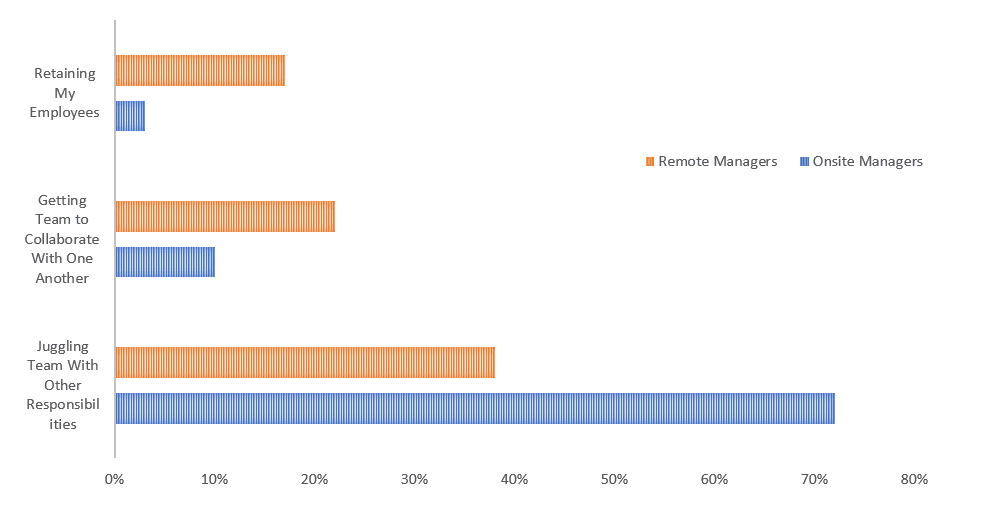How Managers Can Adapt to the New Era of Remote Work
The shift to remote work has brought a new set of challenges for managers across the globe today. The decline in face-to-face communication has now coerced managers into using alternative forms of communication that harness the power of technology. Managers have especially had it tough because they are required to not only boost their own morale but also work on that of their teams.
It is normal for employees to feel disconnected during the remote work standards of today. Communication and collaboration are strained, and although it has been over a year since remote work first began, managers have still not come to terms with the new challenges.
Managing a fully remote team is a new one for most managers and professionals today. A lot of managers find themselves in unchartered territory, with challenges they haven’t experienced before.
Recent research by SoapBox found out that the challenges of retaining employees in remote work are six times more than onsite retention.

Fortunately, a lot of managers have resources and peers they can turn to for help in this regard.
In this article, we take a look at some of the challenges of managing remote teams and how managers can adapt to these challenges. Stick with us for more.
Common Challenges of Managing Remote Teams
Before we focus on techniques managers can follow to adapt to the new era of remote work, let us first take a look at some of the common challenges you may encounter here.
Tracking Team’s Productivity
Tracking your team’s productivity is one of the biggest challenges of remote work. You might be able to see what your team is up to, but you will never be able to find an accurate estimate of how productive they are. A new manager may even feel that they are sitting in a trophy role rather than a position where they can actually influence change.
Hard to Maintain Company Culture
It can be extremely difficult to maintain your company culture when you are managing a remote team. Most companies have a culture they generally follow and adhere to within their dealings and operations. However, maintaining that culture during remote work is easier said than done.
Communication is a Problem
Trying to manage and set effective communication standards between team members can be a problem in remote work. Even if you do communicate well with your team members, you will never be able to create an environment where members communicate with each other.
Hiring
Hiring is another major challenge with remote work. Businesses that have felt the need to hire have gone for new protocols that are vastly different from the ones they previously followed. Managers have especially had to drop standardized procedures and go for new measures.
How Managers Can Adapt to the New Era of Remote Work
We now move on to some concrete measures you can follow as a manager to adapt to the era of remote work. Remember that the initiative you take will lead to a wave of change.
READ : How Programmers.io Handle Work From Home
Lead Tech Improvements
Improving collaboration between remote teams is one of the most critical problems faced by the managers today. As a remote manager, you can pitch solutions to collaboration related problems by pitching tech advancements.
There are a number of paid and free tech solutions that enhance communication and coordination between teams. Just run through them and find the one that best matches your requirements. You don’t have to go down into the technical details as far as the utility of the move is clear to all.
READ: IT managed Services.
Be Empathetic
Empathy and emotional support are two things that all remote managers should ensure. Managers should set expectations according to the required workload but should also leave room for compassion.
Team members might be struggling with mental health problems and other conundrums that come with remote work. As a manager, you need to have a soft spot for employee problems and should show compassion and empathy. If an employee has an emotional breakdown or a panic attack, make sure that you hear them out and reassure them.
Set Expectations and Performance Standards
The most important role for managers in the new era of remote work is to set expectations. Set the type of behaviors you would want your employees to emulate and also clarify goals and objectives for each member.
Objectives tend to become vague during remote work, which is why you should set them clearly for each employee. Also, regularly ask employees about what they feel they can achieve during this period.
Understand Your Limits
As a manager, you’re expected to be at the top of your game at all times. But, you’ve got limits as well, and regularly exceeding them or going beyond them is only going to put you up for disappointment later.
Recognize signs of burnout and take a break when needed. Most managers are working around the clock today to improve collaboration between teams and act as a conduit rather than a barrier to productivity. However, it is also important that you take breaks, find some me-time and maintain a work-life balance.
By understanding your roles and responsibilities as a remote manager, you can simplify the transition to remote work. Learn from the techniques we have mentioned above and break down tasks for success as a remote manager.










